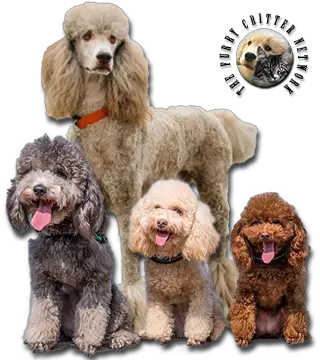Breed Standard
Head: Dignified, straight, in proportion to body. Slightly domed skull. Pronounced occipital peak. Stop not very pronounced. Straight nosebridge. Fairly tight-lipped. Nose matches coat color.
Ears: Fairly long, hanging against the cheeks, tips reaching to the commissure of the lips when outstretched. Covered with wavy, very long hair.
Eyes: Almond-shaped, slightly slanted. Black or very dark brown to dark amber, depending on coat color.
Body: Longer than height at the withers. Solid, slightly arched neck. No dewlap. Chest well let-down. Firm, muscular loin. Tuck-up. Back short, neither arched nor hollow. Croup rounded but not sloping.
Tail: Set on high, docked by one-third or one-half in curly-coated variety. Left natural in corded variety. Raised to a slant in action.
Hair: Curly: abundant, fine, woolly, very curly. Thick, well-furnished, of uniform length, forming regular curls. - Corded: abundant, fine, woolly, dense, forming small, well-defined cords of uniform length. Must be at least 20 cm long (8 in).
Coat: Black, white, brown, gray, and apricot. Brown, gray, and apricot must be solid.
Size: Standard Poodle: 45 to 60 cm. (17.5-23.5 in).- Medium-sized Poodle: 35 to 45 cm. (14-17.5 in).- Poodle: 28 to 35 cm. (11-14 in).- Toy Poodle: less than 28 cm. (11 in).
Weight: Standard Poodle: approx. 22 kg. (48.5 lb), Miniature Poodle: approx. 7 kg. (15.5 lb), Toy Poodle: less than 7 kg. (15.5 lb).
History
This French breed once used to hunt waterfowl was originally named the Miniature Poodle, from the nickname chien cane or canichon (duck dog). "Poodle" is short for Pudelhund, from the Low German pudeln (to splash) and Hund (dog). According to Buffon, the Poodle comes from Africa: He is descended from the Barbet of northern Africa, brought by the Arabs to the Iberian Peninsula, where he was apparently crossed with the Portuguese Water Dog. From Iberia the breed spread throughout Europe, after setting down roots in France. As a result, in 1936 the FCI officially recognized France as the birthplace of the Poodle. A standard was published the same year, and a Poodle club was founded in Paris in 1922. Initially used on waterfowl, the Poodle was kept by noble ladies under Louis XIV, was a lapdog under Louis XV, and was miniaturized under Louis XVI. The Poodle comes in four varieties according to size, but the Standard Poodle has been cast aside in favor of smaller versions (Miniature and Toy). The popularity of the breed peaked in the nineteenth and twentieth centuries. Able to adapt to any life style (whether hunting, performing, or providing companionship), the Poodle soon became the world's most popular pet. Unfortunately, this craze led to overbreeding to the detriment of quality. For this reason, potential Poodle owners should be wary.
Behavior
Active, athletic, merry, very alert, and intelligent, the friendly Poodle delights in life. His loyalty is legendary, but he can be possessive. Highly adaptable, outgoing, and good-natured, he makes a wonderful pet. Still a hunter like his ancestors, he is quite a good swimmer with a very keen nose. If he does not receive firm training, he can become difficult.
He is just as happy in the country as in the city. He hates being left alone. He is very clean and needs daily brushing and combing, as well as one or two baths per month. His ears must be checked regularly, and he requires grooming every two months. There are several different clips: the Continental (or Lion) clip, the Kennel clip (in which the hair is trimmed to the same length on the entire body), the English Saddle clip (with leg bracelets), and the Puppy clip (Continental clip with trousers). Poodles do not shed.
Function
Hunting Dog, Companion Dog
Health
A long-lived breed, Poodles are, nevertheless, subject to many genetic diseases. Some are prone to IMHA (Immune Mediated Hemolytic Anemia), slipped stifle, diabetes, epilepsy, heart disorders, PRA, runny eyes, ear infections and digestive tract problems. Eye problems such as cataracts and progressive retinal atrophy can cause blindness. Skin conditions and allergies are common, sometimes due to shampoo and/or color reinforcer.






